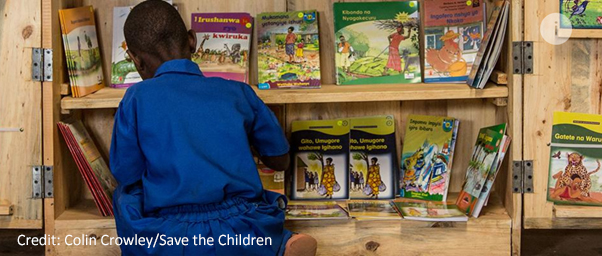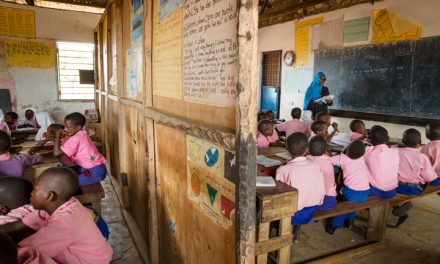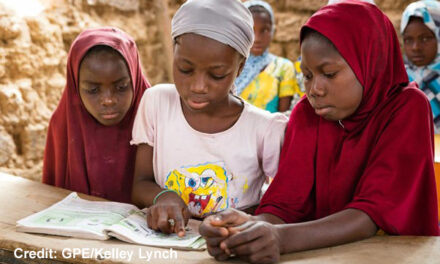This blog was written by Joseph Nhan-O’Reilly, Executive Director of the International Parliamentary Network for Education and published on the Bond website on 15 October 2020.
This week UK prime minister Boris Johnson joined Kenyan president Uhuru Kenyatta to announce that they will co-host the Global Partnership for Education’s (GPE) replenishment summit in 2021.
The goal between now and then is to raise at least US$5 billion to fund GPE’s new five year strategy, GPE 2025. This is GPE’s most ambitious fundraising target and twice as much as it raised at its last financing conference in Dakar in 2018.
There’s no doubting the critical need for more and better aid spending on education.
Before the pandemic struck, 258 million children were out of school, including 130 million girls. And even when children were at school, many were not learning. 53% of 10-year-olds in low- and middle-income countries are not able to read at the expected level, and this increases to 80% in the lowest-income countries.
These countries are now contending with the social and economic impacts of Covid-19. According to the Global Education Monitoring Report, additional costs due to Covid-19 related school closures risk increasing the existing US $148 billion annual financing gap in low- and lower-middle-income countries by up to one-third, or US $45 billion.
Aid to education alone was never going to close those gaps, but there’s a real risk it will dry up altogether, robbing countries of vital discretionary funding that they can use to spark reform and test new ideas.
Even if we optimistically assume that education does not become a lower priority, squeezed budgets due to Covid-19 could translate into a fall of up to US$2 billion by 2022 for education.
Next year’s summit won’t solve all of these challenges, but it will be a crucial test of the international community’s commitment to the global education goals in a post-pandemic world.
The announcement that the UK and Kenya will host the summit is a promising start.
Kenya: an African education success story
Kenya has achieved universal primary education and gender parity in enrolment. It is also making solid progress in improving learning outcomes. With GPE’s support, it has delivered its long term policy goal of one textbook per child (in both English and Kiswahili).
Crucially Kenya also has a good track record on education spending: allocating over 5% of GDP to education and 19% of public expenditure to the sector. This puts it at the top end of the “crucial reference points” for education funding agreed in the Education 2030 Framework for Action.
UK: a leader in the global education sector?
The UK is a universally respected leader in the global education space. It has been a key supporter of the Global Partnership for Education. It also played a central part in the creation and funding of other, newer parts of the international aid architecture, including Education Cannot Wait: the fund for education in emergencies and the proposed International Finance Facility for Education.
Sadly, it’s not all good news. The proportion of the UK’s development budget devoted to education has declined year on year since 2016 and currently stands at just over 6%, down on the average of 9.1% for education between 2011 and 2015. A similar level of UK aid is now spent on banking and financial services.
This stands in stark contrast to the priority that education and specifically girls’ education has been given by the prime minister. As foreign secretary, he initiated a campaign to secure 12 years of quality education for the world’s girls, which he affirmed as a top priority when he moved to Number 10.
Reversing decline in aid to education must be a priority
There’s a strong expectation among UK civil society that the proportion of UK aid for education will grow significantly in the coming years, in line with the prime minister’s stated aims.
His announcement that the UK will co-host GPE’s replenishment is a positive signal for exactly that. The UK will need to lead the way, challenge fellow donor governments to step up and match the UK’s commitment to political leadership and financing.
The UK’s best chances of growing both the funding available and the number of donors providing it is by being clear about its own ambitions, including how much the UK is going to spend.
Harnessing the power of diplomacy for development
During the announcement this week the prime minister shared that education will also be a priority for the UK’s presidency of the G7 in 2021, which the foreign secretary later affirmed in parliament.
It is impossible to imagine a clearer or more authoritative statement of the UK’s global priorities.
The PM and foreign secretary also now have a single government department able to deploy both our development expertise and diplomatic wherewithal with the backing of the aid budget to deliver this ambition. While there are still concerns around the closure of the Department for International Development, the new department poses a practical opportunity and test for the government to demonstrate what progressive, joined up foreign policy looks like.
Until now, global education has consistently struggled to secure both the attention and financing needed to deliver the promises made to the world’s children. This week’s invitation by the prime minister for the world to come to London next year to celebrate a fully funded GPE, together with his commitment to use the UK’s G7 presidency to get more girls into school, has changed that.
We now need to turn that attention into meaningful action, transforming education for the future and preventing the erosion of hard-won gains.





